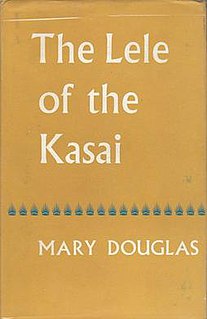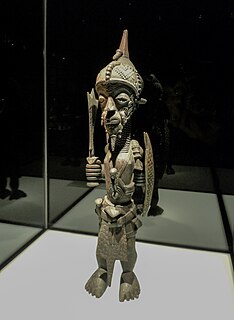Related Research Articles
Luba-Kasai, also known as Western Luba, Bena-Lulua, Ciluba/Tshiluba, Luba-Lulua or Luva, is a Bantu language of Central Africa and a national language of the Democratic Republic of the Congo, alongside Lingala, Swahili, and Kikongo.

Bandundu is one of eleven former provinces of the Democratic Republic of the Congo. It bordered the provinces of Kinshasa and Bas-Congo to the west, Équateur to the north, and Kasai-Occidental to the east. The provincial capital is also called Bandundu.

Kasaï-Occidental was one of the eleven provinces of the Democratic Republic of the Congo between 1966 and 2015, when it was split into the Kasaï-Central and the Kasaï provinces.

Dame Mary Douglas, was a British anthropologist, known for her writings on human culture and symbolism, whose area of speciality was social anthropology. Douglas was considered a follower of Émile Durkheim and a proponent of structuralist analysis, with a strong interest in comparative religion.

South Kasai was an unrecognised secessionist state within the Republic of the Congo which was semi-independent between 1960 and 1962. Initially proposed as only a province, South Kasai sought full autonomy in similar circumstances to the much larger neighbouring state of Katanga, to its south, during the political turmoil arising from the independence of the Belgian Congo known as the Congo Crisis. Unlike Katanga, however, South Kasai did not explicitly declare full independence from the Republic of the Congo or reject Congolese sovereignty.

Kasaï-Oriental is one of the 21 new provinces of the Democratic Republic of the Congo created in the 2015 repartitioning. Kasaï-Oriental, Lomami, and Sankuru provinces are the result of the dismemberment of the former Kasaï-Oriental province. Kasaï-Oriental was formed from the Tshilenge district and the independently administered city of Mbuji-Mayi which retained its status as a provincial capital.
Tetela, also Sungu, is a Bantu language of northern Kasai-Oriental Province, Democratic Republic of the Congo. It is spoken by the Tetela people.
Luba-Katanga, also known as Luba-Shaba and Kiluba, is one of the two major Bantu languages spoken in the Democratic Republic of the Congo called "Luba". It is spoken mostly in the south-east area of the country by the Luba people.

The Lele of the Kasai (1963) was the second book by the influential British anthropologist Mary Douglas and the first under her married name. In it she reported on her anthropological fieldwork among the Lele people on the western bank of the Kasai River in the Basongo area of what had at the time been south-western Belgian Congo. The ending of Belgian colonial rule in 1960 was one of the factors that brought her to abandon the usual practice in anthropological field reports of writing in the present tense. The book describes the social, economic and religious life of a large Lele village.
Lele is an East Manus language of the Austronesian language family spoken in the northeastern part of Manus Island, New Guinea. It has an SVO word order.
Lele is a Mande language of Guinea.
The Aizi speak three languages around Ébrié Lagoon in Ivory Coast.
Lele is a language spoken mainly in the west edge of the Kasai-Occidental Province, in Ilebo and Tshikapa territories; the extreme east of the Bandundu Province, in Idiofa and Gungu territories of the Democratic Republic of the Congo.
The Lyélé language (Lele) is spoken in the Sanguié Province of Burkina Faso by approximately 130,000 people known as Lyéla, Léla, Gourounsi or Gurunsi. It is spoken in the towns of Réo, Kyon, Tenado, Dassa, Didyr, Godyr, Kordié, Pouni and Zawara. The language is also sometimes known by the wider term Gurunsi.
Kela, or Lemba, and Yela are a Bantu language of the Democratic Republic of Congo spoken by several hundred thousand people in the Kasai-Oriental, where the language is called "Kela", and Équateur Province, where it is called "Yela".

The Lulua people are a Bantu ethnic group settled along the Lulua River valley in south central Kasai-Occidental province, Democratic Republic of the Congo. The Lulua are in fact a collection of small groups whose home bordered by the larger Luba state and the related Songye people and Chokwe people, with whom they share a very similar culture, history, and language.

Idiofa Territory is an administrative area in the Kwilu Province of the Democratic Republic of the Congo. The capital is the town of Idiofa.
The Lélé language, Lélémrin, also known as Tiagba(Tiagbamrin) after its principal town, is a Kru language spoken by ethnic Aizi(Ahizi) on the shores of Ébrié Lagoon in Ivory Coast. It is not intelligible with Mobu, also spoken by Aizi at the lagoon.
The Mobu language, Mobumrin, is a Kru language spoken by ethnic Aizi(Ahizi) on the shores of Ébrié Lagoon in Ivory Coast. It is not intelligible with Lele (Tiagba), also spoken by Aizi at the lagoon.

Eleonora "Lele" Pons Maronese is an American Internet celebrity, YouTuber, actress, singer, dancer, model, and former host of La Voz... México. She stars in The Secret Life of Lele Pons, a YouTube Original docuseries providing a look at her personal life, and hosts her own Spotify-exclusive podcast titled "Best Kept Secrets with Lele Pons".
References
- ↑ Encyclopedia of African Peoples (Fitzroy Dearborn Publishers, Chicago and London, 2000), s.v. Lele (p. 125).
- ↑ Mary Douglas, The Lele of the Kasai (1963), ch. 1.
- ↑ Mary Douglas, "Sorcery Accusations Unleashed: The Lele Revisited", in Implicit Meanings (2nd ed., Routledge, 1999), pp. 78-80.
- ↑ Lele language at Ethnologue (16th ed., 2009)
| This article about an ethnic group in Africa is a stub. You can help Wikipedia by expanding it. |